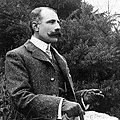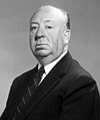Portal:England
The England portal

| |
England is a country that is part of the United Kingdom. The country is located on the island of Great Britain, of which it covers roughly 62%, and over 100 smaller adjacent islands. It has land borders with Scotland to the north and Wales to the west, and is otherwise surrounded by the North Sea to the east, the English Channel to the south, the Celtic Sea to the south-west, and the Irish sea to the west. Continental Europe lies to the south-east, and Ireland to the west. The population was 56,490,048 at the 2021 census. London is both the largest city and the capital.
The area now called England was first inhabited by modern humans during the Upper Paleolithic, but takes its name from the Angles, a Germanic tribe who settled during the 5th and 6th centuries. England became a unified state in the 10th century and has had a significant cultural and legal impact on the wider world since the Age of Discovery, which began during the 15th century. The Kingdom of England, which included Wales after 1535, ceased being a separate sovereign state on 1 May 1707 when the Acts of Union put the terms agreed in the Treaty of Union the previous year into effect; this resulted in a political union with the Kingdom of Scotland that created the Kingdom of Great Britain.
England is the origin of many well known worldwide exports, including the English language, the English legal system (which served as the basis for the common law systems of many other countries), association football, and the Church of England; its parliamentary system of government has been widely adopted by other nations. The Industrial Revolution began in 18th-century England, transforming its society into the world's first industrialised nation. England is home to the two oldest universities in the English-speaking world: the University of Oxford, founded in 1096, and the University of Cambridge, founded in 1209. Both universities are ranked among the most prestigious in the world.
England's terrain chiefly consists of low hills and plains, especially in the centre and south. Upland and mountainous terrain is mostly found in the north and west, including Dartmoor, the Lake District, the Pennines, and the Shropshire Hills. The country's capital is London, the greater metropolitan of which has a population of 14.2 million as of 2021, representing the United Kingdom's largest metropolitan area. England's population of 56.3 million comprises 84% of the population of the United Kingdom, largely concentrated around London, the South East, and conurbations in the Midlands, the North West, the North East, and Yorkshire, which each developed as major industrial regions during the 19th century. (Full article...)
John (24 December 1166 – 19 October 1216) was the king of England from 1199 until his death in 1216. He lost the Duchy of Normandy and most of his other French lands to King Philip II of France, resulting in the collapse of the Angevin Empire and contributing to the subsequent growth in power of the French Capetian dynasty during the 13th century. The baronial revolt at the end of John's reign led to the sealing of Magna Carta, a document considered an early step in the evolution of the constitution of the United Kingdom.
John was the youngest son of King Henry II of England and Duchess Eleanor of Aquitaine. He was nicknamed John Lackland (Norman: Jean sans Terre, lit. 'John without land') because he was not expected to inherit significant lands. He became Henry's favourite child following the failed revolt of 1173–1174 by his brothers Henry the Young King, Richard, and Geoffrey against the King. John was appointed Lord of Ireland in 1177 and given lands in England and on the continent. He unsuccessfully attempted a rebellion against the royal administrators of his brother, King Richard, while Richard was participating in the Third Crusade, but he was proclaimed king after Richard died in 1199. He came to an agreement with Philip II of France to recognise John's possession of the continental Angevin lands at the peace treaty of Le Goulet in 1200. (Full article...)Selected article -
The historic counties of England are areas that were established for administration by the Normans, in many cases based on earlier kingdoms and shires created by the Angles, Saxons, Jutes, Celts and others. They are alternatively known as ancient counties, traditional counties, former counties or simply as counties. In the centuries that followed their establishment, as well as their administrative function, the counties also helped define local culture and identity. This role continued even after the counties ceased to be used for administration after the creation of administrative counties in 1889, which were themselves amended by further local government reforms in the years following.
Unlike the partly self-governing boroughs that covered urban areas, the counties of medieval England existed primarily as a means of enforcing central government power, enabling monarchs to exercise control over local areas through their chosen representatives – originally sheriffs and later the lord-lieutenants – and their subordinate justices of the peace. Counties were used initially for the administration of justice, collection of taxes and organisation of the military, and later for local government and electing parliamentary representation. They continue to form the basis of modern local government areas in many parts of the country away from the main urban areas, although the newly created areas sometimes have considerably altered boundaries from the historic counties on which they are based. A 2016 article says one mainstream political party's "approach to the spatial recalibration of regional government in England has been defined by a myopic focus on economic growth, with little consideration for the established historical, cultural and political identities underpinning existing forms of sub-state citizenship." (Full article...)General images

The Loveday of 1458 (also known as the Annunciation Loveday) was a ritualistic reconciliation between warring factions of the English nobility that took place at St Paul's Cathedral on 25 March 1458. Following the outbreak of the Wars of the Roses in 1455, it was the culmination of lengthy negotiations initiated by King Henry VI to resolve the lords' rivalries. English politics had become increasingly factional during his reign, and was exacerbated in 1453 when he became catatonic. This effectively left the government leaderless, and eventually the King's cousin, and at the time heir to the throne, Richard, Duke of York, was appointed Protector during the King's illness. Alongside York were his allies from the politically and militarily powerful Neville family, led by Richard, Earl of Salisbury, and his eldest son, Richard, Earl of Warwick. When the King returned to health a year later, the protectorship ended but partisanship within the government did not.
Supporters of King Henry and his Queen, Margaret of Anjou, have been loosely called "Lancastrians", the King being head of the House of Lancaster, while the duke and his party are considered "Yorkists", after his title of Duke of York. By the 1450s, York felt increasingly excluded from government, and, in May 1455—possibly fearing an ambush by his enemies—led an army against the King at the First Battle of St Albans. There, in what has been called more of a series of assassinations than a battle, the personal enemies of York and the Nevilles—the Duke of Somerset, the Earl of Northumberland, and Lord Clifford—perished. (Full article...)Did you know?

- ...that the Mendip Hills (commonly called The Mendips) are a range of limestone hills situated to the south of Bristol and Bath in Somerset?
- ...the England and Wales Cricket Board was created on 1 January 1997 combining the roles of the Test and County Cricket Board (TCCB), the National Cricket Association (NCA) and the Cricket Council?
- ...that the Flag of England is the St George's Cross?
- ...that the Tudor rose (pictured) is a traditional heraldic emblem of England and takes its name and origins from the Tudor dynasty?
In the news

- 4 May 2024 – 2024 London mayoral election
- Sadiq Khan wins re-election as mayor of London, England, with 43.8% of the vote, becoming the first London mayor to be elected to a third term. (BBC News)
- 30 April 2024 – 2024 Hainault sword attack
- A man attacks people with a sword after crashing a car into a house in Hainault, London, England, United Kingdom, killing a 14-year-old boy and injuring four other people, including two police officers. (BBC News) (The New York Times)
- 17 April 2024 –
- Scientists announce that they have identified fossil remains of the Ichthyotitan, the largest marine reptile currently known, in the Westbury Formation in England. (NOS)
Selected featured content
Categories
Selected quotes
| “ | I have seen much to hate here, much to forgive. But in a world where England is finished and dead, I do not wish to live. | ” |
Related WikiProjects
England • Bedfordshire • Brighton • Cheshire • Cornwall • Derbyshire • Dorset • Greater Manchester • Hampshire • Lincolnshire • London • Merseyside • Northamptonshire • North East England • Sheffield • Surrey. Warwickshire • West Midlands • Worcestershire • Yorkshire
Topics
Things you can do

- Please visit the English Wikipedians' notice board and help to write new England-related articles, and expand and improve existing ones.
- Visit Wikipedia:WikiProject England/Assessment, and help out by assessing unrated English articles.
- Add the Project Banner to English articles around Wikipedia.
- Check for announcements and open tasks for ways to improve English related articles.
- Help nominate and select new content for the England portal.
- Requested articles: Charterhouse Lane • Renewable energy in England • Ealing Village
- Expand: Dorothy Boyd • David Troughton
Related Portals
 |
 |
 |
 |
 |
 |
 |
 |
| East Midlands | London | North East | North West | South East | South West | West Midlands | Yorkshire and the Humber |

|

|

|

|

|
| Ireland | Northern Ireland | Scotland | United Kingdom | Wales |
Associated Wikimedia
The following Wikimedia Foundation sister projects provide more on this subject:
-
Commons
Free media repository -
Wikibooks
Free textbooks and manuals -
Wikidata
Free knowledge base -
Wikinews
Free-content news -
Wikiquote
Collection of quotations -
Wikisource
Free-content library -
Wikiversity
Free learning tools -
Wikivoyage
Free travel guide -
Wiktionary
Dictionary and thesaurus































![Image 28The Staffordshire Hoard is the largest hoard of Anglo-Saxon gold and silver metalwork yet found[update]. It consists of almost 4,600 items and metal fragments. (from Culture of England)](http://upload.wikimedia.org/wikipedia/commons/thumb/6/60/Staffordshire_hoard_annotated.jpg/120px-Staffordshire_hoard_annotated.jpg)





































































